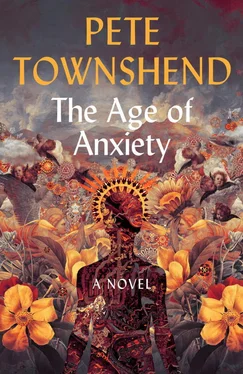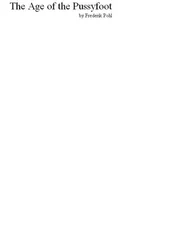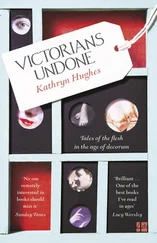Pete Townshend
THE AGE OF ANXIETY
Light. Blinding white light. A man is standing with his back to us, arms outstretched. He is naked to the waist. His hair is golden, curling, shoulder length. We cannot see his face. As we slowly approach the man from behind, he begins to block the light. The sun is setting. His hair creates a halo. Suddenly the man leaps forward and we fly with him, sailing through the sky, over the blue-green landscape toward the sunset.
It is with trepidation that I sit here in my aerie this evening in June, a few days before my sixty-seventh birthday in 2012. I am Louis Doxtader, and this is my story. I am in the topmost room in a house already squatting high on a hill beside a busy road just outside the scruffy southern French hill town of Magagnosc. This house is rented and run by a rather lovely but eccentric psychic woman who invited me to stay with her here this summer. I pay all the bills, and she looks after me so that I can write.
Only she knows why I am driven to relate this story. She knows my secret because she was a witness to it, and understands how important it is for me to demonstrate the way wonderful events have transpired as the result of something I once did that I greatly regret. I don’t want to be forgiven; I want to sense some balance. I can’t change the past, but neither can I allow a misunderstanding of the past to change the future. After you’ve heard my story, you will be able to make up your own mind.
From this lofty position where I sit at my little desk I can see the Mediterranean Sea and the distant Bay of Cannes, the port of La Napoule. Down in the valley is the nearby town of Grasse, famous for its perfume factories. Very few of the fragrances they produce reach me here, but the pine-scented air from the mountains that separate the valley from the pistes drifts down sometimes.
Doxtader, my surname, is probably Dutch in origin, but my great-grandfather was originally from Norway and I have lived in Britain all my life. My father, Edvard—known as Ted—had been named after Edvard Munch, who painted The Scream . A dark, presaging idea when I was a child, and possibly one that helped shape me, as will become clear I hope.
Munch was still alive when my father was born, and my grandparents had met the great man and been impressed. My father Edvard had moved to Britain between the wars, and remained there after the Second World War broke out. My mother always told me he had worked as a spy for the War Office during the war, Norway having capitulated to Germany. He was based near RAF Northolt airport, west of London, from where he went on a number of flight missions to Norway. He met and married my English-Jewish mother, Claire, during the last years of the hostilities and I was born just as Germany was forced to give up on Lebensraum.
I first came to spend long periods of time with my godson, Walter, when he became friends with my daughter, Rain. They were at the same schools together from childhood, and had been born respectively in December and August of 1966.
Walter is a musician. Even at the age of eight he was always blowing and sucking on a harmonica, often with his head inside a plastic bucket in order to amplify the sound and shut out the world. I was close friends with Walter’s parents and in awe of the orchestra in which his father performed.
You might be interested to know how Walter Karel Watts got his middle name. Walter’s father, Harry, was a superbly gifted classically trained musician, but also a science fiction enthusiast. Karel Capek was a Czech playwright who wrote R.U.R. (Rossum’s Universal Robots) . It was Capek’s brother who came up with the word “robot,” which in Czech means “drudge.” Harry had great things planned for Walter, which is why he gave his son a middle name inspired by Karel Capek’s percipient play of 1921 about intelligent machines taking over the world. In his father’s eyes Walter was destined for scientific greatness. Instead Walter chose playing the harmonica.
In their late teens Rain became a journalist and Walter went to horticultural school. But Walter ended up concentrating on the music of the mouth and its associated instruments. Playing in pubs and clubs, he began to earn a good living even while he and Rain were still students. Walter became part of what has been called the Fourth Wave of rock, the one that happened in the nineties—bands like Nirvana, Pearl Jam, and Smashing Pumpkins — but Walter’s own music was a throwback to the post-punk years of the late seventies: the pub rock of Dr. Feelgood, the Stray Cats, the Fabulous Thunderbirds, and the Dave Edmunds Band. This was the simple, honest music Walter wished to revive and honor. Whatever wave he surfed in on, in my eyes Walter K. Watts was and always would be a twenty-first-century fifties pub rocker. That is an addled statement. I am prone to them.
I’m sad to say that as a middle-aged father in the early eighties I succumbed to drugs. I scrambled my brain, and but for a miracle would probably have died penniless. My wife, Pamela, left me, telling me she was taking herself off to a nunnery, and for many years I didn’t know where she was. Incredibly perhaps, she left me with Rain to look after. That turned out to be a clever move, at least for me. The responsibility of looking after Rain, who was still at school with Walter, probably saved my life. I have gone on to do as well in my field as Walter has done in his. For today—while Walter is a famous rock star—I am now a well-known and respected art dealer in what is known as Outsider Art. It is also known by slightly snobbish New York gallery owners—and of course by the French, who invented it—as Art Brut. It is drawing, painting, sculpture, carving, and writing by artists who think differently; indeed, they live differently. Sometimes their work is naive, sometimes it is obsessive, and sometimes it is extraordinarily fine or detailed. Behind such work there is usually a single idea, a single system. There is, sometimes, a revelation, a vision, or a mental explosion underlying the work, and they feel haunted or even possessed. They may hear voices, like a schizophrenic, and believe they are being directed. Some believe God is guiding them.
The miracle of which I speak, the one that really saved my life, was that—perhaps because of what I had done to my brain—I was able to see the value in the work of such mentally complicated artists. I became one of the first dealers in Europe to specialize in Outsider Art. I was certainly the first outside France and New York. Wealthy collectors and even some of the best international galleries acquire this stuff now. Indeed, it was through my work as a dealer that I came across Nikolai Andréevich.
One day in the spring of 1996, sixteen years ago, a woman telephoned me at my home in London. As I have no gallery, I work from home.
“I hope I am not bothering you, Mr. Doxtader, but I have been informed that you are the leading dealer in this country for Outsider Art.” The woman’s voice was rather husky, with what I would call a rather posh accent, tweaked by a soft northern lilt.
“That’s correct,” I replied.
“My name is Maud Jackson. I am the wife of Paul Jackson of the rock band Hero Ground Zero. Perhaps you remember them?”
“Yes I do,” I answered. But I was racking my brain, trying to remember one of their songs. “How can I help you?”
She explained that she had something to show me that might be of interest.
Читать дальше













